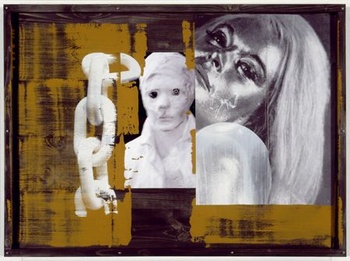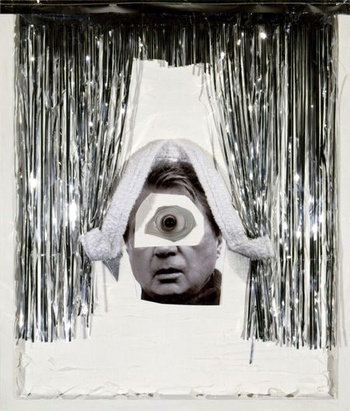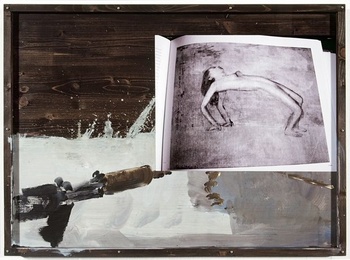The work of the German artist Rosemarie Trockel is not easy to pigeonhole. Conceptual, postmodernist, feminist: none of those terms is adequate to describe her multifaceted oeuvre. It is actually that hybrid and intangible quality that she is out to achieve. As can be seen yet again in “Flagrant Delight”, the fine exhibition that Wiels is currently devoting to her.
Artists are often reduced to their best-known or most iconic work. In the case of Rosemarie Trockel (born in Schwerte in 1952) that means her woven Playboy motifs and cooking rings hung on the wall as minimalist sculptures. In both cases Trockel makes use of material associated with the world of women in order to offer a commentary on phallocentrism. Both the knitting and the cooking rings are to be seen at Wiels. But what makes the exhibition worthwhile is that that kind of readymade reading of her work is broadened out to encompass a body of work that is much more varied than those almost slogan-like works would lead one to suspect.
Trockel’s oeuvre is intentionally hybrid and involves a great diversity of media. Thus the exhibition begins – although a
Rosemarie Trockel beyond the slogan


deliberate choice has been made not to have a beginning or an end, never mind a chronological sequence – with a group of forty collages. Strikingly, these make an almost spatial, sculptural impression, partly due to the fact that the works in question are framed and the frame is often an integral part of the work. In her collages Trockel combines photographs with text, drawings, painted images, newsprint, and a considerable number of items of clothing. In a number of cases, moreover, she sticks replicas of eyes or a nose onto the works. The collages are hard to grasp and radiate an ominous, defiant atmosphere. They function not so much as the usual preparatory studies, but rather as a reflection on earlier works. Gossip, for example, consists of a reproduction of Courbet’s L’origine du monde – an 1866 painting, frequently evoked by Trockel, that presents a full-frontal portrayal of a vagina – onto which the upper body of the artist Raymond Pettibon has been stuck, with in the background a design for a public-space commission. The collage expresses a feminist outlook on being an artist, combined with an intensive formal investigation that also refers to the legacy of Dadaism and surrealism.
Butterflies and the world of men
There is a recurrent tension in Trockel’s work between the rational/analytical and the subjective/subconscious. One could say, schematically, that this is about the contradiction between the male and the female. That recurrent tension is also reflected in her choice of materials, as can be seen, for example, in her assemblage sculptures. In one of those works she hangs a pair of neckties on a minimalist, cube-
Butterflies and the world of men
There is a recurrent tension in Trockel’s work between the rational/analytical and the subjective/subconscious. One could say, schematically, that this is about the contradiction between the male and the female. That recurrent tension is also reflected in her choice of materials, as can be seen, for example, in her assemblage sculptures. In one of those works she hangs a pair of neckties on a minimalist, cube-

like form in steel, thereby playing with the contrast between the bleak industrial material and the colourful textile. Both materials also evoke the world of men, with the tie functioning as a phallic symbol. A butterfly is pinned to one of the ties – a symbol of the male urge to conquer? The other works also involve fascinating choices of material. An austere white cube and rectangle, for example, is made of foam rubber, a material one would not usually expect to see in minimalist art. Trockel often works with ceramics, which in her work are associated with domestic chores and the world of women; she maintains a tension between the fragility and the solidity of the material. That traditional “feminine” is also to be seen in her mechanically executed wool paintings, which play with the opposition between the manual and the mechanical.
Trockel’s diverse oeuvre is disconcerting. She constantly changes style and technique, but her work is never arbitrary: the material is always deployed in a thematically relevant way. With her deliberately quirky work she succeeds in creating an uncomfortable atmosphere, working with associative connections and underlying psychoanalytical meanings. Rather than using facile antitheses as a gimmick, her work fascinates by its formal searching and its surprising choices of material.
Rosemarie Trockel: Flagrant Delight
> 27/5 • wo/me/We > zo/di/Su 11 > 18.00 (1st & 3rd We of the month: > 21.00), €7
WIELS avenue Van Volxemlaan 354, Vorst/Forest, 02-340.00.50, www.wiels.org
Trockel’s diverse oeuvre is disconcerting. She constantly changes style and technique, but her work is never arbitrary: the material is always deployed in a thematically relevant way. With her deliberately quirky work she succeeds in creating an uncomfortable atmosphere, working with associative connections and underlying psychoanalytical meanings. Rather than using facile antitheses as a gimmick, her work fascinates by its formal searching and its surprising choices of material.
Rosemarie Trockel: Flagrant Delight
> 27/5 • wo/me/We > zo/di/Su 11 > 18.00 (1st & 3rd We of the month: > 21.00), €7
WIELS avenue Van Volxemlaan 354, Vorst/Forest, 02-340.00.50, www.wiels.org
Read more about: Expo
Fijn dat je wil reageren. Wie reageert, gaat akkoord met onze huisregels. Hoe reageren via Disqus? Een woordje uitleg.